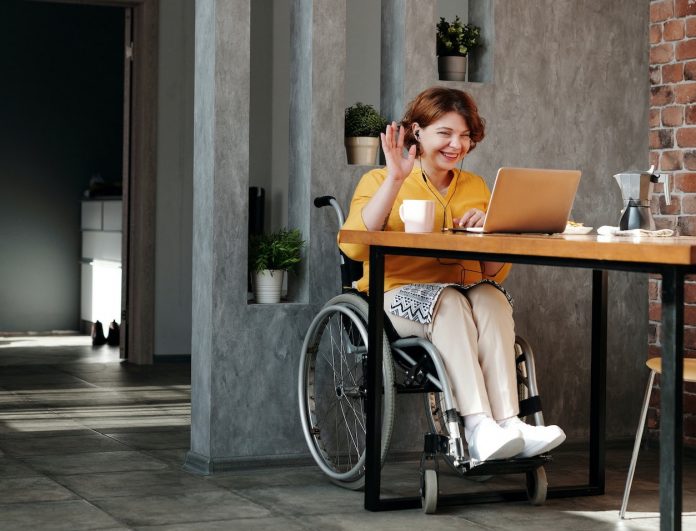In Portugal, people with disabilities continue to face challenges in accessing education, employment, and culture. More than 30% of this population is at risk of poverty or social exclusion. It is still necessary to break physical and cultural barriers to end ableism. The discrimination experienced by people with disabilities is a reality that they encounter daily and throughout their lives. Beyond physical barriers, the cultural obstacles make their lives more difficult.
According to the Disability and Human Rights Observatory (Institute of Social and Political Sciences of the University of Lisbon), the risk of poverty or social exclusion rate was, in 2021, 30.5% in households with people with disabilities, almost double than in households of the general population (18.8%).
Unfortunately, according to colleagues from Consultis, the characterization of the living conditions of people with disabilities are hindered,due to the lack of data regarding this part of the population.The results of the 2021 Census do not allow a rigorous analysis of the population with disabilities in the country.
According to the mentioned source, Statistics Portugal (INE) considers all types of disability (visual, hearing, motor or cognitive) in the same way and in all degrees, from an elderly person with difficulty climbing stairs to a person with disabilities.In addition to hindering the characterization of the living conditions of this part of the population, the Census does not allow to know how many people with disabilities really exist in Portugal. It is difficult to explain how in 2011 INE identified more than 1.7 million people with disabilities, a number that dropped to just over 1 million in the 2021 Census.
Since the 1stof February, companies with more than 100 workers required to integrate people with disabilities
The data gathered by the Disability and Human Rights Observatory show that, in 2020, only 0.59% of the workers of companies with more than ten employees were people with disabilities (55% were women and 45% men). In 2021, almost 20,400 people with disabilities worked in the public sector, 6.500 more than in the private sector. In this context, our colleagues from Consultis consider the extension of the quota system for the employment of people with disabilities in the private sector to be fully justified.
According to the mentioned source, the transition period for companies with more than 100 employees ended at the 31stof January 2023. Now, these companies must employ people with disabilities of 60% or more, in conformity with Law no. 4/2019, which became fully effective on the 1stof February 2023. Otherwise, they will face a fine of about 10 thousand euros. Our colleagues point out that, last year, more than 13,500 people with disabilities were enrolled in the public employment centers.
“Nowadays, many companies are interested in hiring people with disabilities, but they may not know how to comply with the law that requires them to do so. They may have trouble finding suitable candidates or understanding the legal requirements. The law wants to help people with disabilities who can work in their chosen field with or without some adjustments or aids in their workplace. That is why the LEAD project and similar initiatives and efforts are important. They connect people with disabilities and employers directly”, emphasized António Silva Dias, LEAD project manager from Consultis – Consultoria Empresarial, Unipessoal Lda., the Portuguese partner. Our colleague presents two successful initiatives in the field of inclusion of people with disabilities.
Coimbra: CaféKoala promotes integration of young adults with Down syndrome on the labour market
Café Koala is an initiative of the Association for the Support of the Inclusion of Citizens with Down Syndrome in Coimbra (Olhar 21), Association which aims to address the challenges that young people with Down syndrome encounter when they seek employment after finishing their education. In this inclusive cafe, six young people with Down syndrome, aged 16 to 20, are part of the staff. The young staff members acquire skills in preparing coffees, toasting sandwiches, and cooking soups in the Pedagogical Kitchen, an activity offered by Olhar 21. In the Café, they work in shifts, three hours a day. The young adults practice both kitchen tasks, and table service, which enhances their prospects of integration into the labour market.
The “Accessible Vote” project for people with disabilities in Portugal, awarded by the United Nations
The “Accessible vote”, a project of the Federation of Portuguese Cerebral Palsy Associations (FAPPC), won one of The Zero Project awards, granted by the United Nations (UN), during a ceremony in Vienna (Austria). The Zero Project is a United Nations initiative that recognizes innovative and inclusive solutions for vulnerable or disadvantaged groups.
The project team developed a software that allows anyone, with any type of disability or limitation (visual, hearing and/or physical), to vote in person, autonomously and secretly. The software does not use the Internet and is easy to replicate.
The software has been formally tested in Portugal by FAPPC members, which have presented evidence and evaluations of the use of this solution. The aforementioned Federation states that the implementation of this technological solution constitutes an important investment, which will subsequently save public money.
FAPPC argues that this solution is more democratic, civic and economical than electronic voting and that it should be adopted in Portugal. The project complies with the United Nations Convention on the Rights of Persons with Disabilities (Article 29, Point 1, and Paragraph 2) and with the Portuguese Constitution (Article 10), which guarantee the right to a secret vote for all persons. Portuguese legislation also provides for accompanied voting, but according to the FAPPC, this option restricts and limits the rights of some citizens.
The project “Labour market Employment for young Adults with a Disability – LEAD” is funded by Iceland, Liechtenstein and Norway through the EEA and Norway Grants Fund for Youth Employment.


